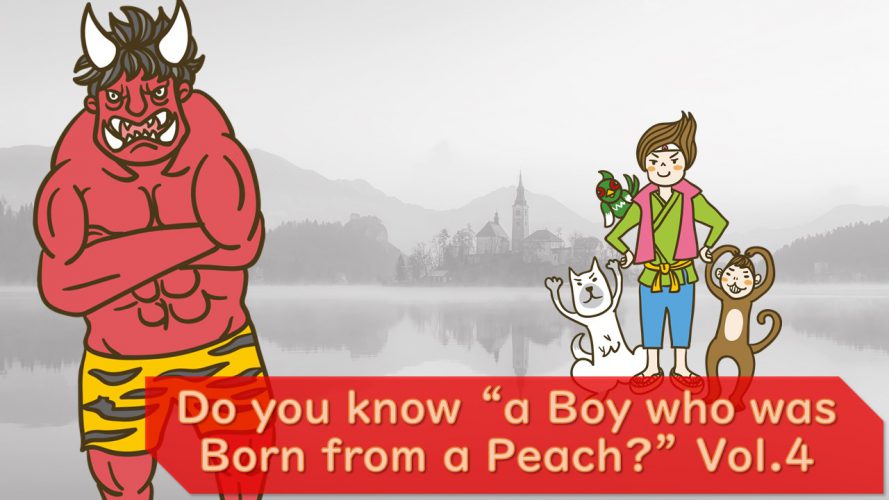JAPANESE LESSON
Do you know “a Boy who was Born from a Peach?” Vol. 4

Today, let’s read a Japanese famous old tale, “桃太郎(ももたろう).” You may know this story as “Peach boy.”
This is a series of the story “桃太郎(ももたろう)” and I recommend you to check the the previous lesson before you read this.
Last time, 桃太郎 sees some animals. Today, he and his animals finally start fighting against demons.
Let’s read the fourth part of the story in Japanese and learn Japanese.
しばらく行くと鬼ケ島(おにがしま)が見(み)えてきました(1)。
After they went for a while, Onigashima came into sight.
「あれが鬼ケ島(おにがしま)に違(ちが)いない(2)。」犬(いぬ)が吠(ほ)えました。
“It must be Onigashima.” Dog barked.
鬼ケ島(おにがしま)に着(つ)くと、お城(しろ)の門(もん)の前(まえ)に、大(おお)きな鬼(おに)が立(た)っており、桃太郎(ももたろう)は大(おお)きな石(いし)をつかむと鬼(おに)に向(む)かって投(な)げました。
When they arrived there, there was a huge demon in front of the castle gate. Momotaro grabbed a big stone and threw it to the demon.
猿(さる)は門(もん)に登(のぼ)り鍵(かぎ)を開(あ)けました。キジは鬼(おに)の目(め)をつつきました。
Monkey went up to the gate and unlocked it. Pheasant pecked the demon’s eye.
「こりゃあ参(まい)った(3)。助(たす)けてくれ~」
“I give up. Help me!”
そういうと、鬼(おに)はお城(しろ)の中(なか)に逃(に)げていきました。
The demon said so and ran into the castle.
Note
(1) 見(み)えてきました
見(み)える means “see” in English, and 「~(し)てくる」shows movement. That’s why the original meaning is like “something comes to one’s sight,” or we can just say “they saw Onigashima” instead.
(2) 違(ちが)いない
“違いない” shows the strong conjecture and the speaker is sure about it.
Here, Dog is sure that it’s Onigashima.
We have other expressions to show conjecture such as “だろう(でしょう)”, “かもしれない”, and “らしい.”
“かもしれない” shows the weak conjecture. In English, “might” will be the same.
“だろう(でしょう)” and “らしい” shows conjecture as well. “だろう(でしょう)” shows the speaker’s conjecture and “らしい” doesn’t show speaker’s one but others’.
For example, “明日(あした/あす)は雨(あめ)が降(ふ)るらしい” will be “It’ll be rainy tomorrow” in English.
We seem that the speaker has watched the weather forecast or has heard from someone and is telling us about that.
“明日は雨が降るでしょう(だろう)” will be “It’ll be rainy tomorrow” as well, but we seem that the speaker thinks so in a certain reason.
(3) 参(まい)った
“参(まい)る” has several meanings.
- humble expression of “go”
- to surrender, to be defeated ← this time
- to be annoyed
For 1, we can say “明日(あした)そちらへ参(まい)ります” and it means “I’ll come to you tomorrow.”
This is the same as “明日そちらへ行きます” and “明日そちらに伺います.”
“行きます” means simply “go.” you can use this most frequently.
“参ります” and “伺います” are humble expressions of “go”. You can use these when you talk with your superiors.
If you go to the person you talk with, you can use “伺います” because “伺う” originally means “visit.”
For 2, Japanese people use this phrase when they surrender. Judoka use “参った” when they surrender.
For 3, it may not be familiar with you. Japanese people use this when they are annoyed with something.
For example, “近頃(ちかごろ)の暑(あつ)さには参(まい)ったな” means like “I can’t stand for the recent heat.” or “I’m sick of the recent heat.”
This is the fourth part of “桃太郎.” They arrived the Onigashima and start fighting.
We have 1 more part for this story.
I recommend you to read the story aloud in Japanese as a practice.
I hope you are looking forward to the continuation.

Leave a Comment